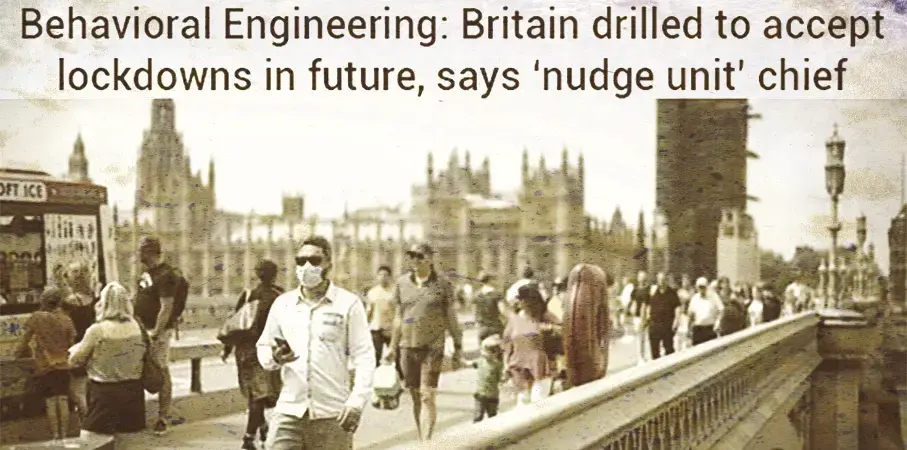From The Telegraph
Britain has been drilled to comply with lockdown under a future pandemic, the chief executive of the ‘nudge unit’ has said.
Professor David Halpern told The Telegraph that the country had “practised the drill” of wearing face masks and working from home and “could redo it” in a future crisis.
Last Tuesday, Matt Hancock told the public inquiry that Britain must be ready to combat future disease outbreaks with wider, earlier and more stringent lockdowns.
Speaking on the Lockdown Files podcast, the government adviser Prof Halpern predicted that the country would comply with another ‘stay at home’ order because they “kind of know what the drill is”.
In an interview given before Mr Hancock’s testimony, the leading behavioural scientist even suggested that the nation’s prior experience made it “much easier to now imagine” the population would accept future local restrictions.
Comment: Maybe, at least a significant number might, for a while; although it’s notable that the attempt at imposing dystopian ’15-minute-cities’ hasn’t gone down well with people: UK’s 15-minute cities under fire for causing ‘dangerous’ delays to emergency services, roadblocks vandalised as revolt grows
Prof Halpern said that while fear-based messaging in general is not effective, he defended its use in extreme circumstances.
“There are times when you do need to cut through… particularly if you think people are wrongly calibrated,” he said.
Comment: ‘Wrongly calibrated’ people need reeducating, apparently.
The suggestion that Britain might be primed to accept further social-distancing restrictions is likely to alarm lockdown-sceptics concerned by the collateral damage such measures cause.
When the pandemic hit, Mr Hancock’s department enlisted the professor’s Behavioural Insights Team (BIT) – better known as the ‘nudge unit’ – to provide them with “frictionless access to behavioural expertise”, according to a £1 million contract.
BIT used earworm slogans such as ‘hands, face, space’ to maximise compliance with Covid rules.
In his most wide-ranging interview since March 2020, Prof Halpern explained that his unit’s campaigns were devised to help reinforce new behaviours.
He said their posters acted as visual prompts so that “when you go into a shop or somewhere else, it re-reminds you, it cues, it acts as a trigger for the behaviour”.
The professor said that this messaging encouraged mask-wearing, meaning people felt “naked” when they forgot to put one on.
“Put it this way,” he said. “You would feel like, ‘Oh my God, I haven’t got my mask’. You feel naked, right?”
Once the public has learnt a new behaviour, Prof Halpern said: “In principle, you can switch it back on.”
Comment: People are apparently like robots.
“You’ve got the beginning, particularly, of what is called a habit loop: if this has happened, then you should do that,” he said.
Major disasters “leav[e] this enduring trace on society”, he explained. As well as knowing the drill, this “quasi-evolutionary” impact is a strong indicator of future behaviour, he claimed.
Comment: It was a traumatic period, and a worrying number of people do still believe the contrived coronavirus crisis was a ‘disaster’, however a significant number of people are realising that it wasn’t what they were led to believe, and that their society is now worse of for following the rules: Excess deaths DOUBLED in 2021, NOT from Covid, lockdown partly to blame, WHO research reveals
Faced with another contagious disease, the professor predicted that the British public would start wearing masks again “relatively rapidly if they were persuaded”.
“They might protest, ‘do we really have to do it?’ [Showing] good healthy scepticism. But once you’ve exercised those muscles, they’re more likely to be reused again,” he said.
As a result, the British public – having learnt to work from home – would be more likely, he believed, to accept stay-at-home measures being used to clamp down on local outbreaks.
“We figured out a lot more than we did before, so we’ve practised the drill and we could redo it,” he said.
“Imagine if it happens, not across the whole population, but it happened in an area, a city, and you said, ‘it is really important to do the following thing’.
“It is much easier to now imagine that that city would then say, ‘OK, we better do this, stay at home and wear masks when we’re out or whatever.”
The nudge unit chief acknowledged that not everyone complied with Covid restrictions. In early 2021 his team identified that 8 per cent of the population were “super spreaders”.
“They’re the ones you really worry about,” he said.
Comment: People immune to the brainwashing and coercion? They were also called ‘refuseniks by the propaganda press.
While BIT was not behind the government’s controversial ‘can you look them in the eyes?’ posters, Prof Halpern said: “I can perfectly understand why they were put together in the way they were.”
These frightening images could have been aimed at non-compliant individuals for whom the message was “not emotionally cutting through”, he suggested.
The Covid behavioural science advice that ministers received from multiple sources has drawn scrutiny. Last year the pandemic response and recovery APPG called for an inquiry into its use.
Co-chair Esther McVey MP said: “We must ask the question: was it ethical to deploy covert psychological strategies on the British people?”
Responding to criticism that some nudge unit adverts were “unnecessarily scary”, Prof Halpern said there is precedent for tougher messaging. The frightening 1986 AIDS tombstone campaign is “thought genuinely to have saved a lot of lives”, he pointed out.
He added that behavioural interventions should be debated openly, saying: “It’s entirely appropriate for a democratic engagement to be had.”
Behavioral Engineering UK




